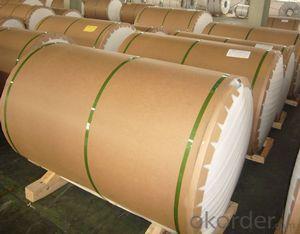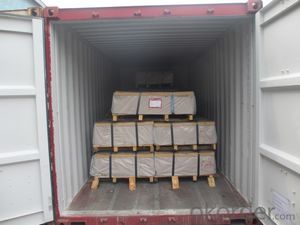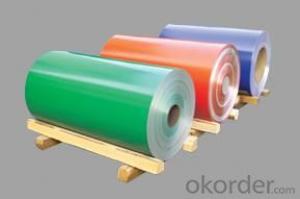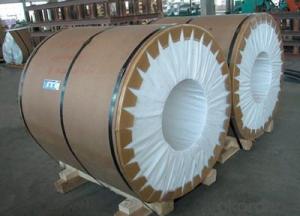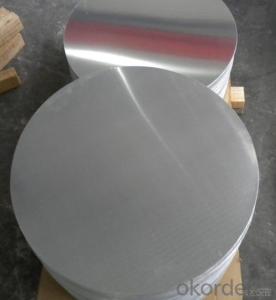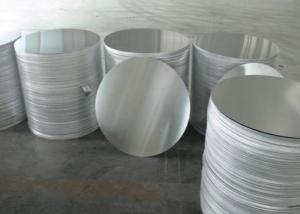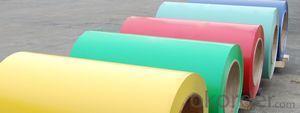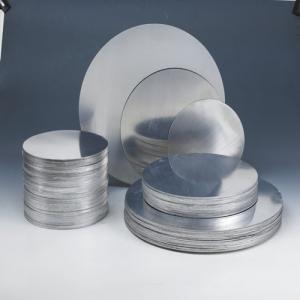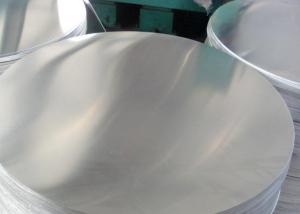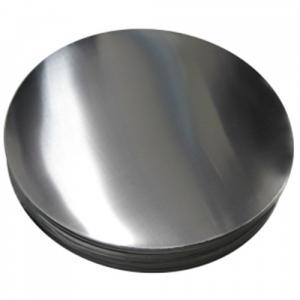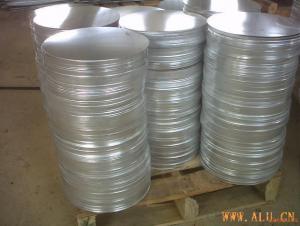Roll of Aluminum Coil - AA 1070 Diameter 500mm Aluminium Circles
- Loading Port:
- Shanghai
- Payment Terms:
- TT OR LC
- Min Order Qty:
- 20 m.t.
- Supply Capability:
- 800000 m.t./month
OKorder Service Pledge
Quality Product, Order Online Tracking, Timely Delivery
OKorder Financial Service
Credit Rating, Credit Services, Credit Purchasing
You Might Also Like
supply Mill-finished / coated aluminum circles /sheet/ coil:
Alloy: AA1050,1060,1100,1200,2024,3003,3304,3005,3015,5052,5086,5754,5083,6061,7050,7475,8011, etc
Temper: O, H14/16/18/22/24/32/ H112/H321/T6,T851,T7451,T7351, etc
Thickness: 0.02mm—20mm
Width: 100mm—2000mm (Can be slitted)
Notice: PE coating / PVDF coating / Embossment can be done if required.
- Q: Can aluminum coils be used in aerospace heat exchangers?
- Yes, aluminum coils can be used in aerospace heat exchangers. Aluminum is a commonly used material in the aerospace industry due to its lightweight and high thermal conductivity properties. Heat exchangers are crucial components in aerospace systems, responsible for transferring heat from one medium to another. Aluminum coils are highly effective in conducting heat, making them suitable for use in aerospace heat exchangers. Additionally, aluminum is corrosion-resistant, which is important in the harsh environments encountered in aerospace applications. Its low density also contributes to fuel efficiency by reducing the overall weight of the aircraft. Therefore, aluminum coils are a preferred choice for aerospace heat exchangers due to their excellent thermal conductivity, lightweight properties, and resistance to corrosion.
- Q: Are aluminum coils compatible with different welding methods?
- Yes, aluminum coils are compatible with different welding methods. Aluminum is a versatile metal that can be welded using various techniques such as gas tungsten arc welding (GTAW), also known as TIG welding, and gas metal arc welding (GMAW), also known as MIG welding. These methods are commonly used for welding aluminum coils due to their ability to produce high-quality welds with good strength and appearance. TIG welding is particularly suitable for aluminum as it allows for precise control of heat input and provides excellent weld quality. It uses a non-consumable tungsten electrode and an inert gas such as argon to shield the weld zone from atmospheric contamination. MIG welding, on the other hand, is a faster process that uses a consumable wire electrode and a shielding gas to protect the weld pool. It is widely used in industrial applications due to its efficiency and ease of use. In addition to TIG and MIG welding, other methods such as laser welding and friction stir welding can also be used for aluminum coils, depending on the specific requirements of the application. It is important to note that proper preparation, including cleaning and surface treatment of the aluminum coils, is crucial for achieving successful welds. This ensures the removal of any contaminants or oxide layers that may negatively affect the welding process. Overall, aluminum coils are compatible with different welding methods, and the choice of technique depends on factors such as the desired weld quality, production requirements, and the skills and equipment available.
- Q: Aluminum is a metal and nitrate (nitrogen) is a non metal so shouldn't they form an ionic bond and not a covalnt bond? And if it were an ionic bond wouldn't it be called aluminum mononitrate? But it is a covalnt bond (thus a molecular bond and so there is no mono in the name). Pleas help I'm very confused!
- You have the advantage here. As far as I know, the compound is ionic with one Al^+3 ion and three NO3^-1 ions. There have to be 3 negative ions to balance the charge of +3 on the aluminum ion to make a neutral formula unit
- Q: Hey! I have an Aluminum MacBook (2.4 GHz Core 2 Duo, 9400m graphics processor), and I'm wondering whether it's worth updating to the new 2011 13 MacBook Pro. I'm mainly looking for two things: 1. What would be the difference between the 2.4 GHz Core 2 Duo, and the 2.3 GHz i5, and 2. What would be the difference between the 9400m and the HD 3000 Graphics?Thanks! :)
- The macpro is the better machine, but for most people the difference would be negligible. your aluminum is still MORE than good enough for almost all people. What are you using it for? If you're into CAD, by all means upgrade. But if you're just surfing the net, save your money. HD3000 is actually worse graphics, but the rest of the machine is better EDIT: AGAIN, it depends on what you are using it for!!! Despite using additional details, you never once discussed how it is to be used. If you read the post, it says, for most people the difference would be negligible. IF your needs are resource intensive, you might need to replace it. If your needs are not resource intensive, you can save your money. For example, I don't need to buy a new car every year, I usually make it last 5-6 years. But my computing requirements are high enough where I replace my laptops every two years and desktops alternating years so I always have a machine that is less than a year old. MOST people squeeze 4 or more years out of a computer. If you are a general ed, humanities or undeclared your aluminum would suit you just fine thgouh your lower 2 years even though it is older. You could then get a new computer for your upper division. If you were a engineering or architecture student, I'd upgrade after first year courses, If you're in business or engineering, get a PC, if you're in architecture, journalism, music or design get a mac. Any other major, it really doesn't matter. Good luck in school!
- Q: What are the maximum operating temperatures for aluminum coils?
- The maximum operating temperatures for aluminum coils typically range from 300 to 400 degrees Fahrenheit, depending on the specific grade and alloy of aluminum being used.
- Q: where is aluminum found in the world or in the universe?do u think aluminum is more valuable to people than gold?why or why not?im just lazy to look up the answers and person 4 best answer 10points
- where is aluminum found in the world aluminum is in fact the third most common element in the Earth's crust, and it is the most common metallic element on Earth. In a pure form, aluminum is silvery white and extremely lightweight. aluminum is more valuable to people than gold? aluminum continues to remake the modern world. We can see it everywhere; in architecture, transportation, electrical cables, communications and consumer products. Because it’s light-weight, strong, versatile and easy to recycle, aluminum is becoming more and more valuable in our daily lives melting point and boiling point Melting Point: 933.437 K (660.323°C or 1220.581°F) Boiling Point: 2792 K (2519°C or 4566°F)
- Q: And what are the advantages/disadvantages of steel aluminum in building cars?Which would be better for building cars?
- Similarities - They are both metals, conduct electricity and heat and deform elastically then plastically. Difference - every mechanical property there is! Density, elastic modulus (stiffness), strength and hardness are all higher for steel. But, for building cars it is about design, weight, forming, manufacturing, joining and cost. Better depends on what you are trying to acheive - cost or weight saving - and there is not a hard and fast rule as to which metal helps which. Have a look at either the Jaguar S type which is aluminium (as is the Audi A6). Most Ford cars are still steel (as are Renault). Check out the crash test results.
- Q: What is the primary function or use of a spring steel wire coil?
- <p>A spring steel wire coil is primarily used for its high elasticity and strength. It is designed to return to its original shape after being deformed, which makes it ideal for applications requiring resilience and durability. Common uses include the manufacturing of various types of springs, such as compression springs, torsion springs, and extension springs, found in automotive suspensions, mechanical devices, and industrial equipment. The coil's properties also make it suitable for applications in furniture, electronics, and other industries where a reliable and consistent force is needed.</p>
- Q: How are aluminum coils shipped and transported?
- Aluminum coils are typically shipped and transported using various modes of transportation such as trucks, trains, and ships. They are usually wrapped in protective packaging, such as plastic or wood, to prevent damage during transit. The coils are loaded onto pallets or specialized carriers, secured with straps or bands, and then placed in shipping containers or onto flatbed trucks for transportation. The chosen mode of transport depends on the distance to be covered and the specific requirements of the shipment.
- Q: This question asks about potential health hazards linked to the use of aluminum coils in culinary settings.
- <p>There are some concerns about using aluminum cookware due to the potential for aluminum to leach into food, especially at high temperatures or in acidic environments. While the human body needs small amounts of aluminum, excessive intake can be harmful. It has been linked to neurological disorders, although the evidence is not conclusive. Most health organizations, including the FDA, consider aluminum cookware safe for general use. However, for those who are concerned, alternatives like stainless steel, cast iron, or non-stick coatings are available. It's always best to follow manufacturer's guidelines and avoid using aluminum cookware for acidic or highly acidic foods to minimize any potential risk.</p>
Send your message to us
Roll of Aluminum Coil - AA 1070 Diameter 500mm Aluminium Circles
- Loading Port:
- Shanghai
- Payment Terms:
- TT OR LC
- Min Order Qty:
- 20 m.t.
- Supply Capability:
- 800000 m.t./month
OKorder Service Pledge
Quality Product, Order Online Tracking, Timely Delivery
OKorder Financial Service
Credit Rating, Credit Services, Credit Purchasing
Similar products
Hot products
Hot Searches
Related keywords
